Thousands of retired and active civil servants, public-school teachers and military personnel took to the streets in Taipei yesterday, demanding that the government abstain from targeting them in planned pension reforms.
In the first massive demonstration since President Tsai Ing-wen (蔡英文) took office in May, protesters spilled from Ketagalan Boulevard onto Zhongshan S Road and several other roads blocks away, with the Taipei Police Department estimating that about 117,000 attended, while organizers claimed there were more than 250,000 participants.
The size of the crowd was swelled by an official mobilization by the Chinese Nationalist Party (KMT), with KMT Chairwoman Hung Hsiu-chu (洪秀柱) pledging to “stand with” the protesters.
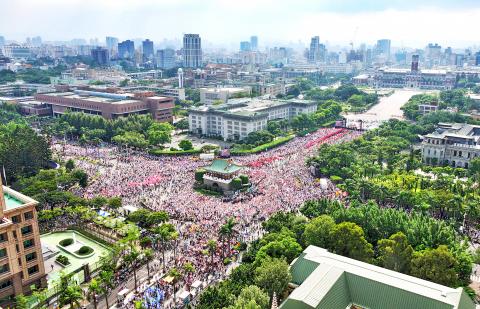
Photo: Lo Pei-der, Taipei Times
While Hung did not take to the stage, she greeted the leaders of one line of former military personnel with flowers and flags, with participants having photographs taken with her.
The KMT also set up several “gas stations” — a play on the Mandarin phrase “add oil,” an expression of encouragement — along march routes, handing out water and Republic of China (ROC) flags.
“Reform absolutely should not be carried out by putting labels on people or pitting generations against each other,” she said, adding that her party had pushed for pension reforms under former president Ma Ying-jeou (馬英九) while the DPP had stalled the efforts in the legislature.
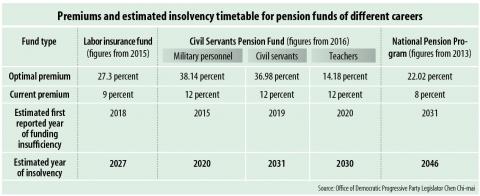
Former premier Hau Pei-tsun (郝柏村) marched in his capacity as a former army general, while several KMT legislators and city councilors also took part.
The demonstration began yesterday afternoon with retired military personnel gathering outside Daan Forest Park (大安森林公園) and National Chiang Kai-shek Memorial Hall before marching to the rally site on Ketagalan Boulevard in front of the Presidential Office Building, walking in formation, waving large ROC flags and singing military anthems.
Retired civil servants, police officers and firefighters gathered at the 228 Peace Memorial Park before walking to Ketagalan Boulevard, while retired public-school teachers converged at National Chiang Kai-shek Memorial Hall’s Liberty Square.

Photo: Chang Chia-ming, Taipei Times
Protesters shouted slogans opposing “stigmatization” and demanding “dignity,” with the Alliance for Monitoring Pension Reform — which organized the march — calling for fiscal reforms and fund management improvements to offset some of the need for cuts, while also demanding that any changes to benefits and contribution formulas not be applied retroactively.
Tsai has asked the Presidential Office’s National Pension Reform Committee to draft a consensus pension reform plan, with Minister Without Portfolio Lin Wan-i (林萬億), the deputy convener and executive director of the committee, pledging to resign if a plan is not drafted and submitted to the Legislative Yuan by May next year.
Some protesters expressed distrust of Tsai’s push for reforms.
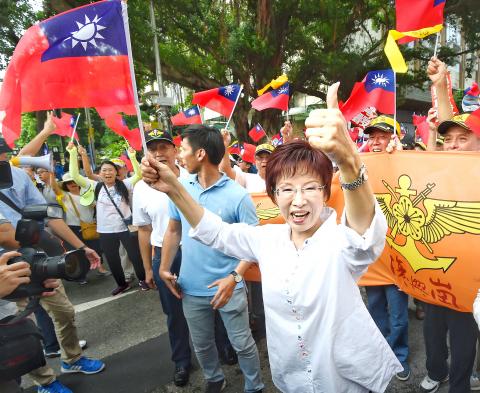
Photo: Fang Pin-chao, Taipei Times
“We are afraid of pension reform, because the Democratic Progressive Party (DPP) is now in full control,” said a woman surnamed Chan (詹), who said she is a former civil servant living in Taichung. “Without the KMT’s participation, there is no way to know what the final plan will look like beforehand. Waiting until a plan is announced would be too late. We have to step forward now before anything is finalized.”
Chan said that the government’s focus on discussions over relative “replacement ratios” between salaries and pensions for public and private-sector employees was unreasonable because of the different nature of the systems.
“We had to go through testing before being hired and that door is always open,” she said. “So if you think we have better treatment, you can always take the test yourself.”
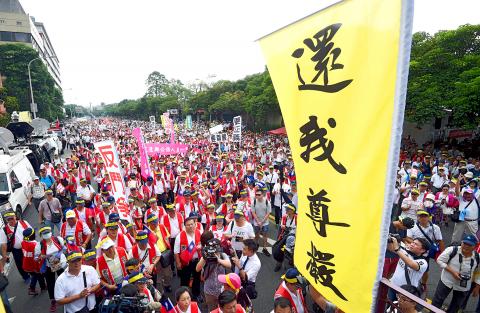
Photo: Lo Pei-der, Taipei Times
“We feel that fiscal reform should be comprehensive and not just targeted at us,” said Kuo Wen-ching (郭文進), a retired soldier, who called for the government to raise taxes on corporations instead of trying to “hunt down” former government employees.
He also rejected remarks by Tsai on Friday that former military personnel had “special circumstances” that warranted their being treated differently as part of pension reform, accusing her of trying to divide former government employees while remaining “coy” about the nature of cuts.
According to the committee, there are 13 pension programs in effect in Taiwan.
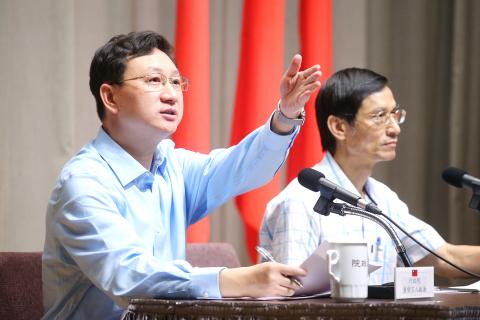
Photo: CNA
The average monthly pension is NT$49,379 for military personnel, NT$56,383 for civil servants, NT$68,025 for public-school teachers, NT$17,223 for private-school teachers, NT$16,179 for employees covered by labor insurance, NT$7,256 for farmers and NT$3,628 for workers covered by general public insurance, it said.
Low contributions coupled with the nation’s aging population have put most of the funds on course for bankruptcy within two decades, with Minister of Civil Service Chou Hung-hsien (周弘憲) last week saying that pension contributions by civil servants, military personnel and teachers would have to be tripled for the funds to be sustainable over the next 50 years at current payment levels.
At a news conference at the Executive Yuan later yesterday, Lin said the committee would convene pension reforms meetings next month and in November across the nation before a national conference in January or February next year.
Additional reporting by CNA

AGING: As of last month, people aged 65 or older accounted for 20.06 percent of the total population and the number of couples who got married fell by 18,685 from 2024 Taiwan has surpassed South Korea as the country least willing to have children, with an annual crude birthrate of 4.62 per 1,000 people, Ministry of the Interior data showed yesterday. The nation was previously ranked the second-lowest country in terms of total fertility rate, or the average number of children a woman has in her lifetime. However, South Korea’s fertility rate began to recover from 2023, with total fertility rate rising from 0.72 and estimated to reach 0.82 to 0.85 by last year, and the crude birthrate projected at 6.7 per 1,000 people. Japan’s crude birthrate was projected to fall below six,

US President Donald Trump in an interview with the New York Times published on Thursday said that “it’s up to” Chinese President Xi Jinping (習近平) what China does on Taiwan, but that he would be “very unhappy” with a change in the “status quo.” “He [Xi] considers it to be a part of China, and that’s up to him what he’s going to be doing, but I’ve expressed to him that I would be very unhappy if he did that, and I don’t think he’ll do that. I hope he doesn’t do that,” Trump said. Trump made the comments in the context

SELF-DEFENSE: Tokyo has accelerated its spending goal and its defense minister said the nation needs to discuss whether it should develop nuclear-powered submarines China is ramping up objections to what it sees as Japan’s desire to acquire nuclear weapons, despite Tokyo’s longstanding renunciation of such arms, deepening another fissure in the two neighbors’ increasingly tense ties. In what appears to be a concerted effort, China’s foreign and defense ministries issued statements on Thursday condemning alleged remilitarism efforts by Tokyo. The remarks came as two of the country’s top think tanks jointly issued a 29-page report framing actions by “right-wing forces” in Japan as posing a “serious threat” to world peace. While that report did not define “right-wing forces,” the Chinese Ministry of Foreign Affairs was

PREPAREDNESS: Given the difficulty of importing ammunition during wartime, the Ministry of National Defense said it would prioritize ‘coproduction’ partnerships A newly formed unit of the Marine Corps tasked with land-based security operations has recently replaced its aging, domestically produced rifles with more advanced, US-made M4A1 rifles, a source said yesterday. The unnamed source familiar with the matter said the First Security Battalion of the Marine Corps’ Air Defense and Base Guard Group has replaced its older T65K2 rifles, which have been in service since the late 1980s, with the newly received M4A1s. The source did not say exactly when the upgrade took place or how many M4A1s were issued to the battalion. The confirmation came after Chinese-language media reported